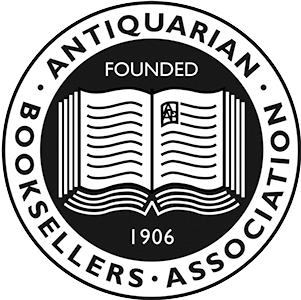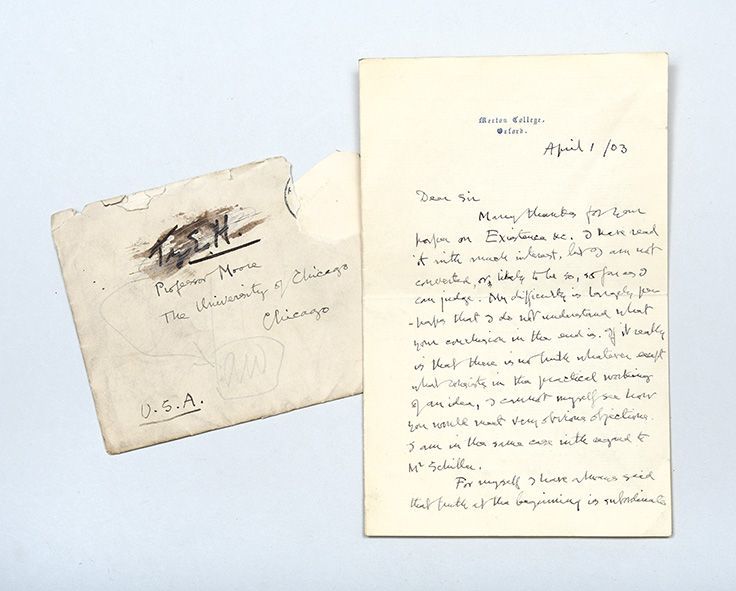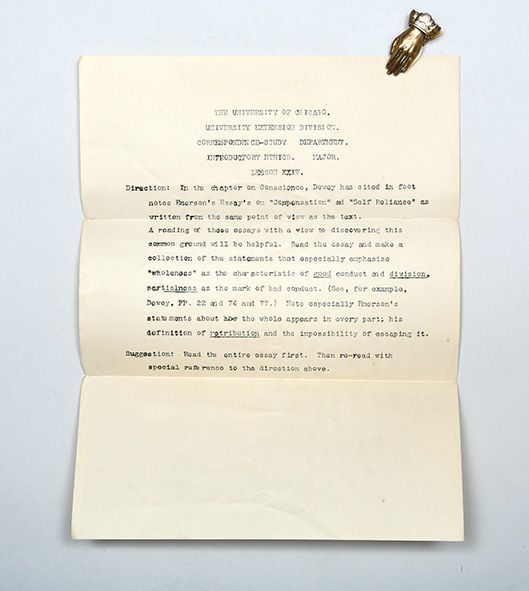[Various:] , c.1902-20. An archive providing insight into "the Armageddon of Philosophy" (Schiller) A collection of autograph correspondence, lecture notes, and papers written by or addressed to the American pragmatic philosopher Addison Webster Moore (1866-1930). Comprising almost forty letters and well over 100 pages of notes, it offers valuable insight into the life and work of one of the most important figures in the establishment and defence of the Chicago school of American pragmatism. The archive comes from Moore's estate, inherited by descent. The correspondence features letters to Moore written by many of the noted luminaries of early 20th-century Anglo-American philosophy and psychology, including William James, the "originating force" of the "Golden Age of American philosophy" (McDermott, p. xxiii); John Dewey, "arguably the most prominent American intellectual for the first half of the 20th century" (Hildebrand); F. H. Bradley, the leading figure among the British Idealists; Arthur Oncken Lovejoy, James' student and author of The Great Chain of Being (1936), which in 1981 was called "the most influential single work in the history of ideas in the United States during the last half century" (Hintikka, p. 3); F. C. S. Schiller, the prominent German-British philosopher and eugenicist; several early presidents of the American Psychological Association such as James Mark Baldwin, Hugo Münsterberg, and Mary Whiton Calkins (its first female president); and more. Short biographies of all the correspondents represented in the collection, an itemized list of the forty-nine items present, and a detailed summary of the contents of each are available on request. In the text below, unless stipulated otherwise, all quotations are taken from items contained within the collection. During the early stages of the 20th century, Moore and his Chicago colleagues were engaged in formalizing and furthering the pragmatic philosophy and functional psychology that had been developed by William James and Charles Sanders Peirce. As John R. Shook, editor of the Collected Writings of Addison W. Moore, writes: "Prior to William James's death in 1910, the triumvirate of James (at Harvard), Dewey (at Columbia), and Moore (at Chicago) animated the pages of the Journal of Philosophy with their pragmatic manifestos, defensive responses to criticisms and queries, and brisk rejoinders and re-rejoinders" (p. xi). Moore in particular engaged in this work with fervour, and became known as the "bulldog of pragmatism" for his fiercely polemical writings (Shook, p. xiii). Moore took up the pragmatist mantle from James with the publication of his book-length study, Pragmatism and Its Critics, which appeared in 1910, just a few months after James' death. The archive highlights how pragmatism tried to dissociate itself from the philosophy of the old world and its institutions, represented primarily by F. H. Bradley at the University of Oxford. One letter present, from Bradley to Moore, records the former's response to Moore's "Existence, Meaning and Reality in Locke's Essay and in Present Epistemology" (1903), in which he had specifically critiqued Bradley's idealist theory of knowledge. Bradley writes that he is "not convinced" by Moore's argument and maintains his idealist stance in his claim that truth has a "relative independence for human beings". The letter is annotated by Moore in response. Others reacted more positively. By 10 March 1903, James had written to Moore to tell him that he had read it with "the most rapturous delight", calling Moore "a great new force for the 'Truth'": "you have reconstructed my thought out of its disintegration". In the same letter, he encouraged Moore to adopt a "pluralistic ontology", which anticipates James's later writings on A Pluralistic Universe (1909) but seems to be an early reference in 1903. Mary Whiton Calkins exclaimed that she was "so impressed with [the] value" of Moore's work. F. C. S. Schiller's letters are particularly effusive. In one lengthy missive, in which he describes pragmatism as "the biggest thing since Descartes", Schiller maps out an entire intellectual history for the movement, tracing its roots all the way back to Aristotle. Against this, he juxtaposes the idealist lineage of the "old fogies", extending from Plato in Ancient Greece to Bradley. Schiller writes that "the walls of Jericho [in Oxford] are beginning to totter & we must keep on pegging away, hitting at all the blockheads... once we get B. engaged, we can beat him, & after that there is no one else who counts". He remarks that "B. lays himself open in many directions & an angry man seldom reasons well. It will be the Armageddon of Phil[osoph]y". Moore's extensive lecture notes demonstrate his sustained commitment to the importance of education. They also bear traces of connections with Moore's published works, particularly Pragmatism and Its Critics, which was composed from lectures he gave in 1908 and buttressed with essays that had appeared in journals from as far back as 1904. If Moore was publicly bullish in Pragmatism and Its Critics and elsewhere, this material suggests that he may have been more anxious and reserved in private. A letter from Dewey dated just two months after its publication praises a series of six lectures that Moore had written but about which he had previously been disparaging. Dewey encourages Moore, telling him that the lectures "are systematic - they are brilliant". He goes on to say that he hopes Moore "will get to publishing" them soon, since "there is nobody else who can do just what you have done". Moore has largely been overshadowed by Dewey and James, but they were in no doubt as to his importance. On discovering Moore's work, James's immediate response was to write and tell him: "you are a divine philosopher". Dewey, for his part, gave the credit to Moore, telling James in correspondence published elsewhere that Moore had "given at least as much as he [had] received" from their association (letter #00802). Shook argues that "Moore's work should be brought out from the shadows cast by James and Dewey" (p. ix). This collection goes some way to doing just that, and simultaneously illustrates the vibrancy of an intellectual community that believed in the need to "make philosophy really efficient again," as Schiller wrote to Moore. Together 49 items, itemized into two categories: 1) 39 autograph letters signed to Moore from his American (15) and British (24) colleagues, on various institutional and personal letterheads, and 1 letter to his wife from Marie Louise Obrist; 2) 9 sets of autograph or typed notes relating to teaching, research, conference proceedings, and lectures, on a variety of subjects, the documents mostly undated and unattributed, many likely by Moore given the context and subject matter. American correspondents include: James Mark Baldwin, Mary Whiton Calkins, John Dewey, George Holmes Howison, William James, David Starr Jordan, Arthur Oncken Lovejoy, and Hugo Münsterberg. British correspondents include: Francis Herbert Bradley, John Ellis McTaggart, William Pepperell Montague, F. C. S. Schiller, Andrew Seth-Patterson. Provenance: by descent from the family of Addison W. Moore. Overall in very good condition. David Hildebrand, "John Dewey", The Stanford Encyclopedia of Philosophy, Winter 2018 Edition, ed. Edward N. Zalta, available online; Jaako Hintikka, "Gaps in the Great Chain of Being: An Exercise in the Methodology of the History of Ideas", Reforging the Great Chain of Being: Studies of the History of Modal Theories, Springer Science+Business Media, 1981; John J. McDermott, "Introduction", The Writings of William James: A Comprehensive Edition, University of Chicago Press, 1977; John R. Shook, "Introduction", The Collected Writings of Addison W. Moore, vol. 1: Writings 1896-1910, Thoemmes Press, 2003. For the letter from John Dewey to William James, c.19 December 1903, see The Correspondence of John Dewey, vol. 1: 1871-1918, ed. Larry A. Hickman, Intelex Corporation, 1999.



















